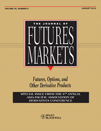
JOURNAL OF FUTURES MARKETS
Scope & Guideline
Connecting Theory and Practice in Financial Markets
Introduction
Aims and Scopes
- Futures and Derivatives Market Analysis:
The journal publishes research that delves into the structure, behavior, and dynamics of futures and derivatives markets, including pricing mechanisms and market microstructure. - Risk Management and Hedging Strategies:
A significant focus is placed on risk management techniques and strategies employed in futures trading, exploring how various financial instruments can be utilized to hedge against market risks. - Volatility Modeling and Forecasting:
The journal emphasizes studies on volatility, including its measurement, modeling, and forecasting, which are crucial for understanding price movements in futures markets. - Interconnectedness and Spillover Effects:
Research exploring the interconnectedness of different asset classes, markets, and the spillover effects of shocks across financial systems is a key area of interest, highlighting systemic risks. - Behavioral Finance in Futures Trading:
The journal also addresses the behavioral aspects of trading in futures markets, investigating how psychological factors influence trading decisions and market outcomes. - Innovative Analytical Methods:
The use of advanced analytical techniques, including machine learning and network analysis, to improve understanding and predictive capabilities in futures markets is a distinct feature of the journal.
Trending and Emerging
- Impact of Geopolitical Risks on Markets:
There is a growing emphasis on the study of geopolitical risks and their impact on commodity futures markets, reflecting the increasing importance of global events on financial stability and pricing. - Machine Learning and AI in Trading Strategies:
The integration of machine learning and artificial intelligence into trading strategies and risk management is becoming a prominent theme, showcasing the journal's focus on technological advancements in finance. - Climate Change and Environmental Factors:
Research addressing the implications of climate change on commodity pricing and trading strategies is gaining traction, indicating a broader awareness of environmental impacts on financial markets. - Behavioral Insights and Market Dynamics:
The exploration of behavioral finance principles and their influence on market dynamics is emerging as a key area, as researchers seek to understand how psychological factors affect trading behaviors. - Dynamic and Adaptive Risk Management Techniques:
The trend towards dynamic and adaptive risk management techniques is evident, as researchers investigate more flexible strategies that can respond to real-time market changes and volatility. - Volatility of Volatility and Its Applications:
The concept of volatility of volatility is increasingly being explored, particularly in relation to its applications in pricing and risk assessment in futures markets, reflecting a more nuanced understanding of market behavior.
Declining or Waning
- Traditional Commodity Pricing Models:
There has been a noticeable decrease in publications focusing solely on traditional commodity pricing models, as researchers increasingly explore more complex and dynamic approaches that incorporate behavioral and market factors. - Static Hedging Strategies:
Research on static hedging strategies appears to be declining, with a growing preference for dynamic hedging techniques that adapt to changing market conditions and incorporate real-time data. - Local Market Analyses:
The focus on localized market analyses, which examine specific commodities or regional futures, has diminished as the journal emphasizes broader, cross-market studies that highlight global interconnectedness. - Historical Analysis of Market Trends:
Studies that primarily focus on historical trends without integrating contemporary issues or advanced methodologies have become less frequent, reflecting a shift towards more relevant and applied research. - Single-Factor Models in Risk Assessment:
The exploration of single-factor models for risk assessment has waned, with a trend towards multi-factor models that better capture the complexities of modern financial markets.
Similar Journals

FINANCE AND STOCHASTICS
Unlocking the Secrets of Stochastic FinanceFinance and Stochastics is a leading academic journal published by Springer Heidelberg, focusing on the intricate interplay of finance, probability, and statistics. With an impressive impact factor and ranked within the Q1 category in both finance and statistics, it serves as an essential resource for researchers and professionals seeking to advance their understanding of stochastic modeling in financial contexts. The journal has maintained a strong reputation since its inception, with contributions from renowned scholars worldwide. The editorial team prioritizes high-quality research that addresses contemporary challenges in financial mathematics and extends the boundaries of statistical methods. Nestled in the heart of Germany, Finance and Stochastics embraces a broad scope, inviting submissions that explore innovative approaches to economic theory and quantitative methodologies. This combination of rigorous academic standards and commitment to impactful research makes the journal a pivotal avenue for disseminating knowledge and fostering collaboration in the finance and statistics communities.
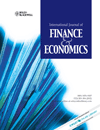
INTERNATIONAL JOURNAL OF FINANCE & ECONOMICS
Innovative Perspectives on Finance & EconomicsInternational Journal of Finance & Economics, published by Wiley, is a premier academic journal that serves as a vital resource for researchers and professionals in the fields of finance, accounting, and economics. With an impressive impact factor and a reputation for excellence, the journal is recognized in the 2023 Scopus rankings, placing in the top quartiles across multiple categories, including Q2 in Accounting, Economics, and Finance. The journal has been a significant contributor to academic discourse since its inception in 1996, with its converged years extending to 2024, thereby ensuring the continuous advancement of knowledge in these critical areas. Although it operates under a traditional subscription model, its comprehensive articles provide insightful analyses, empirical research, and theoretical advancements that cater to a diverse audience—from seasoned scholars to emerging students in the field.
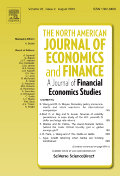
North American Journal of Economics and Finance
Driving innovation through impactful research.The North American Journal of Economics and Finance is a premier academic journal published by Elsevier Science Inc. since 1992, dedicated to advancing the field of economics and finance through rigorous research and scholarship. With an impressive impact factor and recognition in the Q2 category for Economics and Econometrics and Q1 for Finance as of 2023, this journal holds a significant position in the academic community, ranked #41 out of 317 in Finance and #100 out of 716 in Economics. The journal features high-quality, peer-reviewed articles that cover a broad range of topics, from theoretical frameworks to empirical analyses and practical applications. Though not an open-access platform, the journal provides valuable insights for researchers, practitioners, and students alike, promoting knowledge dissemination in the dynamic landscape of economic and financial studies. With its commitment to excellence, the North American Journal of Economics and Finance serves as an essential resource for those seeking to deepen their understanding of contemporary issues in these critical fields.
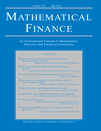
MATHEMATICAL FINANCE
Advancing Knowledge in Quantitative FinanceMATHEMATICAL FINANCE is a prestigious journal published by Wiley, focusing on the interdisciplinary fields of finance, applied mathematics, accounting, and economics. With its ISSN 0960-1627 and E-ISSN 1467-9965, this journal has earned its place in the top tier of academic publications, reflected by its Q1 rankings across multiple categories in 2023, including Accounting, Applied Mathematics, Economics and Econometrics, Finance, and Social Sciences. MATHEMATICAL FINANCE, which commenced publishing in 1991, is recognized for its rigorous peer-review process and its significant contribution to the advancement of knowledge in quantitative finance methodologies and risk management practices. Although it does not currently offer open access, the journal remains an invaluable resource for researchers, professionals, and students seeking to stay abreast of the latest theoretical advancements and empirical studies in mathematical finance. Its impact factor and Scopus rankings further illustrate its high standing within the academic community, making it an essential platform for impactful research and scholarly discourse.
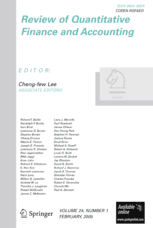
Review of Quantitative Finance and Accounting
Empowering Research with Quantitative PrecisionThe Review of Quantitative Finance and Accounting, published by Springer, is a distinguished academic journal that has been at the forefront of scholarly discourse since its inception in 1991. With an ISSN of 0924-865X and an E-ISSN of 1573-7179, this journal specializes in the interdisciplinary realms of accounting and finance, particularly emphasizing quantitative methodologies and their applications in real-world scenarios. With an impressive track record reflected in its 2023 rankings, it sits in the Q2 category across key fields such as Accounting, Business Management, and Finance, demonstrating its relevance and influence within these domains. Although it operates without an Open Access option, the journal's content remains vital for researchers, professionals, and students aiming to deepen their understanding of quantitative approaches in finance and accounting contexts. The Review of Quantitative Finance and Accounting stands as an essential resource for advancing knowledge and fostering innovation within these critical disciplines.
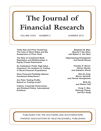
JOURNAL OF FINANCIAL RESEARCH
Advancing Knowledge in Finance and AccountingThe JOURNAL OF FINANCIAL RESEARCH, published by WILEY, stands as a pivotal platform for disseminating innovative research in the fields of finance and accounting since its inception in 1978. With an ISSN of 0270-2592 and an E-ISSN of 1475-6803, this journal aims to address contemporary challenges and trends within the financial research landscape. It has achieved notable recognition, being placed in the Q2 category for both Finance and Accounting in the 2023 rankings, signifying its relevance and impact within the academic community. Although it does not currently offer open access, the journal is accessible through various academic databases, catering to a diverse audience of researchers, professionals, and students keen on advancing their knowledge and understanding of financial systems and methodologies. With an evolving scope that encompasses empirical studies, theoretical frameworks, and practical applications, the JOURNAL OF FINANCIAL RESEARCH is committed to contributing valuable insights into the complexities of financial practices and policies.
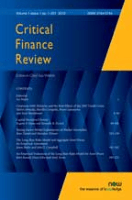
Critical Finance Review
Unveiling the intricacies of financial systems with scholarly precision.Critical Finance Review is a premier academic journal dedicated to advancing the field of finance through the publication of high-quality research that spans various dimensions of the discipline. Published by NOW PUBLISHERS INC, this journal has quickly established itself as a leading source of innovative finance scholarship, achieving a notable Q1 classification in the 2023 finance category. Operating under a rigorous peer-review process, the journal ensures the academic integrity and relevance of its content, which attracts contributions from both emerging and established scholars. With an ISSN of 2164-5744 and E-ISSN 2164-5760, it is accessible to a global audience, though it operates under traditional access models. The journal welcomes a diverse range of topics including, but not limited to, risk management, financial markets, and quantitative finance, making it an essential resource for researchers, professionals, and students who are keen to explore the complexities of financial systems and develop new insights in the ever-evolving landscape of finance. Based in the United States, Critical Finance Review holds a significant position within the academic community, fostering a collaborative environment that encourages innovative thinking and practical applications of financial theories.

JOURNAL OF FINANCIAL AND QUANTITATIVE ANALYSIS
Illuminating Critical Issues in Financial AnalysisJOURNAL OF FINANCIAL AND QUANTITATIVE ANALYSIS, published by Cambridge University Press, is a premier peer-reviewed journal that has been at the forefront of the finance and economics fields since its inception in 1966. With a notable impact factor reflecting its Q1 status in Accounting, Economics and Econometrics, and Finance for 2023, the journal is recognized for its substantial contributions to both theoretical and empirical research. Researchers and practitioners alike benefit from its comprehensive scope, addressing critical issues in financial analysis and quantitative methods. Although the journal does not currently offer open access, it remains widely accessible through institutional subscriptions. The editorial team is committed to fostering rigorous academic discussions that shape the future of finance and economics, making it an essential resource for academics, students, and industry professionals seeking to deepen their understanding of these vital disciplines. For more than five decades, this journal has continued to be an indispensable platform for disseminating influential research, thus solidifying its role as an essential cornerstone in the financial and quantitative analysis community.

Asia-Pacific Financial Markets
Exploring the Dynamics of Finance in the Asia-Pacific RegionAsia-Pacific Financial Markets is a distinguished academic journal published by SPRINGER, dedicated to advancing the field of finance research in the Asia-Pacific region. With an ISSN of 1387-2834 and an E-ISSN of 1573-6946, this journal fosters scholarly discourse on contemporary financial markets, investment strategies, and economic policy implications. Situated within the Q3 category in Finance for 2023, it ranks #140 out of 317 in the Scopus database, reflecting its growing significance and impact within the financial research community, as evidenced by its 55th percentile ranking. Since its inception in 1996, the journal has served as a pivotal platform for researchers, professionals, and students alike, featuring rigorous empirical studies and theoretical frameworks that address emerging financial trends and challenges. While it operates under a subscription model, the journal's comprehensive scope and commitment to high academic standards make it an essential resource for anyone looking to deepen their understanding of finance in the dynamic Asia-Pacific landscape.

SIAM Journal on Financial Mathematics
Exploring the Mathematical Foundations of FinanceThe SIAM Journal on Financial Mathematics, published by SIAM PUBLICATIONS, is a premier journal dedicated to the intersection of applied mathematics and finance. With an ISSN of 1945-497X, this journal serves as a vital platform for the dissemination of innovative research that addresses complex financial problems through mathematical modeling and analytical techniques. The journal has established itself within the Q2 quartile in the categories of Applied Mathematics, Finance, and Numerical Analysis, reflecting its influence and significance in these fields. Researchers and practitioners will find a wealth of knowledge spanning topics from stochastic calculus to quantitative finance, making it essential for anyone aiming to advance their understanding of financial mathematics. As the journal continues to converge from 2010 to 2024, it promises to remain a cornerstone resource for academics, professionals, and students alike, facilitating the ongoing dialogue between mathematics and its applications in the financial industry.